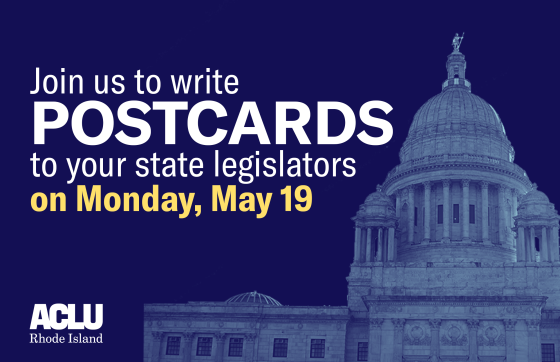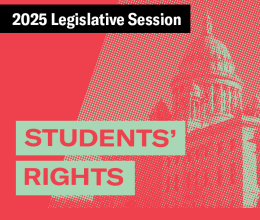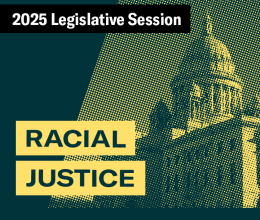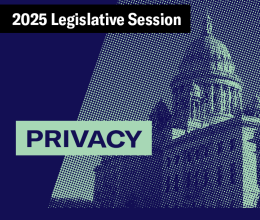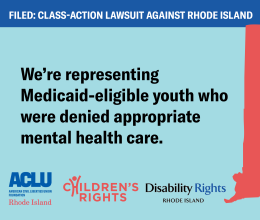The ACLU today joined with other education and civil rights advocates, parents and a former employee of Rhode Island Department of Education’s (RIDE) testing office to call attention to the dangerously low NECAP scores released by the Rhode Island Department of Education (RIDE) earlier this month. The statewide scores for the NECAP, a test that this year will become the determining factor for high school graduation for the class of 2014 and those to follow, showed 4,200, or two in five, Rhode Island 11th graders, are in jeopardy of not graduating from high school next year. These numbers include almost two in five students in the middle-class community of Warwick, providing evidence of the detrimental impact this poor public policy will have on all Rhode Island communities whether upper, middle or lower income.
The ACLU and the other groups, including RI Legal Services, Young Voices, and the RI Disability Law Center, encouraged parents to take action by calling their legislators and urging support of legislation introduced in the Rhode Island House (H-5277) and Senate (S-177) to eliminate high stakes testing as the determinant for access to a high school diploma. The bill would bar the use of statewide written standardized tests as a high stakes requirement for graduation and would require that appropriate support services be provided to students. The first hearing on the bill is in the House Health, Education and Welfare Committee on Wednesday, February 27 at 4:30 p.m.
Rick Richards, a retired employee of RIDE’s Offices of Testing, School Improvement and School Transformation, said today: “With 40 percent of the 11th graders in danger of not graduating, every parent in this state has to know that this way of determining graduation can put their child in danger. And, as parents think this over, they should realize that, in a very real sense, this is a crisis manufactured by policy makers at RIDE. The Department adopted a graduation policy based in political ideology, not evidence. Unfortunately, RIDE’s decision to adapt an unproven policy puts the class of 2014 center stage in an experiment that will, in many, many cases, be life changing. And, in all too many cases, this experiment will be devastating.”
Every Community is Affected
Although communities with larger minority and low-income populations host the highest percentages of students who may lose out on a high school diploma, the suburbs also will be greatly impacted. One in two students from Johnston, two in five from Tiverton and one in five in Narragansett may not receive a diploma. In fact, in Smithfield, a community recently highlighted in The Providence Journal for its improving test scores, one in five students are in jeopardy of not graduating.
“Whether you live in East Greenwich, Narragansett, Warwick, Providence or Barrington, parents and community leaders must pay attention and recognize that their own children are at potential risk,” said ACLU of Rhode Island Executive Director Steven Brown. “RIDE’s policy is creating an entirely new category of adults who, due to an arbitrary score on a test, will not have a high school diploma with which to get a job or continue on in their higher education. Sadly, many will be forced to carry this stigma undeserved.“
Brown pointed out that of the 38% of Warwick students in jeopardy, 84% are special needs or IEP, 37% are white, and 55% are economically disadvantaged. “Unlike RIDE, we do not believe Rhode Island’s education system has failed 40% of its students. This is about students who, for example, have particular learning disabilities or anxieties that prevent them from performing adequately on the test. More importantly, it is about denying diplomas to students using a test never meant to be used in this way. The thought of the fate that awaits many of these students is unfathomable. Unless this is stopped, RIDE’s implementation of high stakes testing will unfairly change the course of these students’ lives and prevent them from showing their true potential.”
Parents Speak Out
At the press conference, Tina Egan from East Greenwich and Margaret Lopes of Warren spoke about the negative effects of the NECAP on their children’s lives. “My daughter is in an inclusive academic environment. She is a hard working student with solid grades, but for her, passing the NECAP is like you or me trying to cross a tightrope from one tall building to another,” said Egan, a parent and attorney from East Greenwich whose daughter has Down’s Syndrome. “With this policy in place, she will never receive a high school diploma and her future options for training and educational opportunities may be limited.”
Talk of Alternative Options Gives Parents False Hope
Veronika Kot, an attorney at Rhode Island Legal Services, said families and students have been told that if all else fails, there are alternative tests, waivers and appeals available to those students who don’t improve enough on their NECAPs to graduate. “This is misleading,” she said. “In fact, as opposed to helping students succeed, the alternative tests available to students are generally more difficult, and waivers are, by RIDE’s own terms, available only ‘in extremely rare cases.’ Unfortunately, the talk of these limited and exclusive options is giving parents false hope.”
The assembled group called for the elimination of the test as the sole determinant of graduation eligibility and the institution of responsible, fair and indiscriminate graduation requirements. They also urged Rhode Island parents to pay close attention to this issue and encouraged concerned parents to voice their opposition to RIDE, Gov. Lincoln Chafee and to their local legislators.

